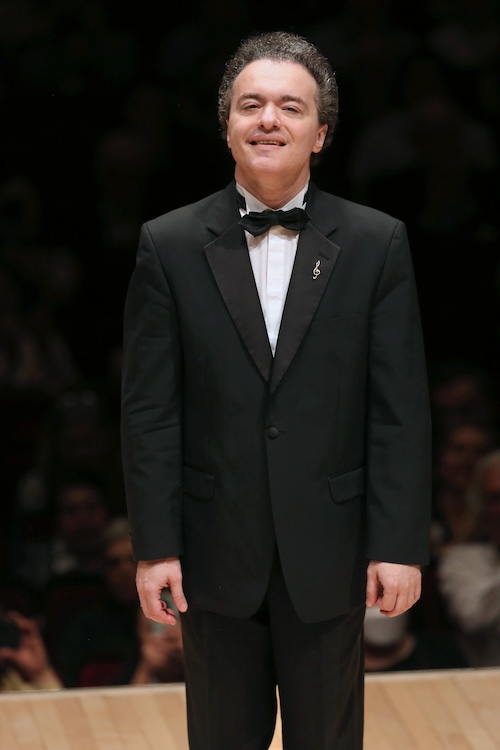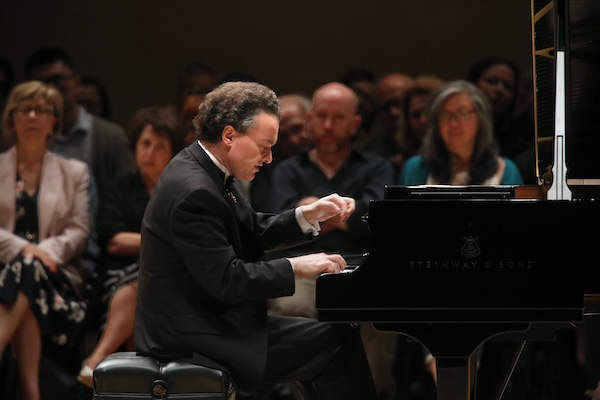Kissin’s depth and generosity illuminate the music and the recital form
Most of the best-known and loved classical musicians have that status for a reason; they are among the finest at their instruments, delivering the kind of bravura technique that thrills the ears and even the eyes of many listeners. They have staying power as artists because of another quality, which is insight—they think long and hard about the music they are playing, why they are playing it, what they hear in it, and how they can express that to the listener via sound.
That was what the exalted pianist Evgeny Kissin did at Carnegie Hall Friday night in front of an adoring crowd—including on-stage seating—that (spoiler alert!) called him back with multiple standing ovations for three encores. By then, he had played Beethoven’s Piano Sonata No. 27 in E minor; Chopin’s F-sharp minor Nocturne, Op. 48, no. 2 and the Op. 49 Fantasy in F minor; and after intermission Brahms’ Four Ballades, Op. 10 and Prokofiev’s Piano Sonata No. 2.
In terms of the notes, this was all splendid. Kissin’s superb pianism—his dexterity, command of the nuances of color, and sheer volume (without thickness) of sound—would have satisfied anyone who would enjoy hearing these specific pieces. But without this great skill, he couldn’t have expressed such thoughtful, deep, and individual musicality, which was the real story at this concert.
The Beethoven performance was fascinating. Kissin played things absolutely his own way, starting with the slow tempo of the first movement. It did not quite align with the marking but was within reason, and he reinforced the logic by nearly isolating Beethoven’s chords. His view of the form broke it down into sections smaller than in typical sonata analysis, moving from sonority to sonority, the horizontal lines mainly transitions to get from one cluster of muscular chords to another.
His syncopations and accents in the right hand were idiosyncratic, almost wrong-footed, but his deliberate pace in both movements made it clear this was what he intended, and that clarity and his conviction made it work; one quickly went from wondering what he was doing to finding it absolutely sensible. The second movement was far less songlike and more percussive than one has heard and perhaps Beethoven imagined, but Kissin made it work as almost an etude, a way to get a sustained and truly gorgeous tone of the piano via attacks and accents.
His playing of Chopin fit more closely into familiar styles, as if what Kissin found in it was within the consensus of what other pianists find in it. One was impressed, again, with the feeling of substance in the sound of the Nocturne—it was big, wide, complex, deep—it would have been heavy under anyone else’s hands, but here it had massive dimensions and still floated. In the Fantasy, he explored the edges of expressive freedom while outlining all the structural and formal details of the music, the rare experience of hearing Chopin as composer and improviser simultaneously.
The second half was even more involving and impressive. The Ballades sounded new, in that one had not heard them with the uncanny confidence that this is how Brahms himself heard them. The rhythms had strength and clarity, without heaviness, and Kissin laid out the structural details bar by bar while playing with a great humanity. Again, tempos were slightly on the slower side, Kissin hearing the music that way and ensuring one heard it too (although the quietest passages were plagued by a ringing phone, a problem throughout the concert).
What one heard was an expression that was slightly understated in manner so that one could appreciate its power and complexity. One heard real artistic honesty and trust that Brahms’ knotty conflict between sophistication and earthiness, that edge between reticence and pathos would be clear and palpable.
The Prokofiev sonata was almost giddy. Here was a chance to witness Kissin’s technique in that bravura sense, and also appreciate his sensibility for music that, expressively, is the opposite of Brahms. The music plays with the conventions of romantic expression, twisting them with sardonic humor, and also twisting away into some haunting and beautiful passages. Kissin seemed to not only be enjoying himself immensely, but observing himself playing in the same way the audience was, and getting a kick out of that.
His encores seemed to show that as well. One of the most gracious of performers, he shows genuine appreciation for the audience, and that seemed to motivate the encores. He played Chopin’s Mazurka in A minor, Op. 67, no. 4, the March from Prokofiev’s The Love for Three Oranges, and Brahms’ famous Waltz, Op. 39, no. 15, in A-flat Major. More than just continuing a recital tradition, this was Kissin saying, “What a night, let’s have some more!”
Evgeny Kissin repeats this program, 8 p.m. May 29. carnegiehall.org


